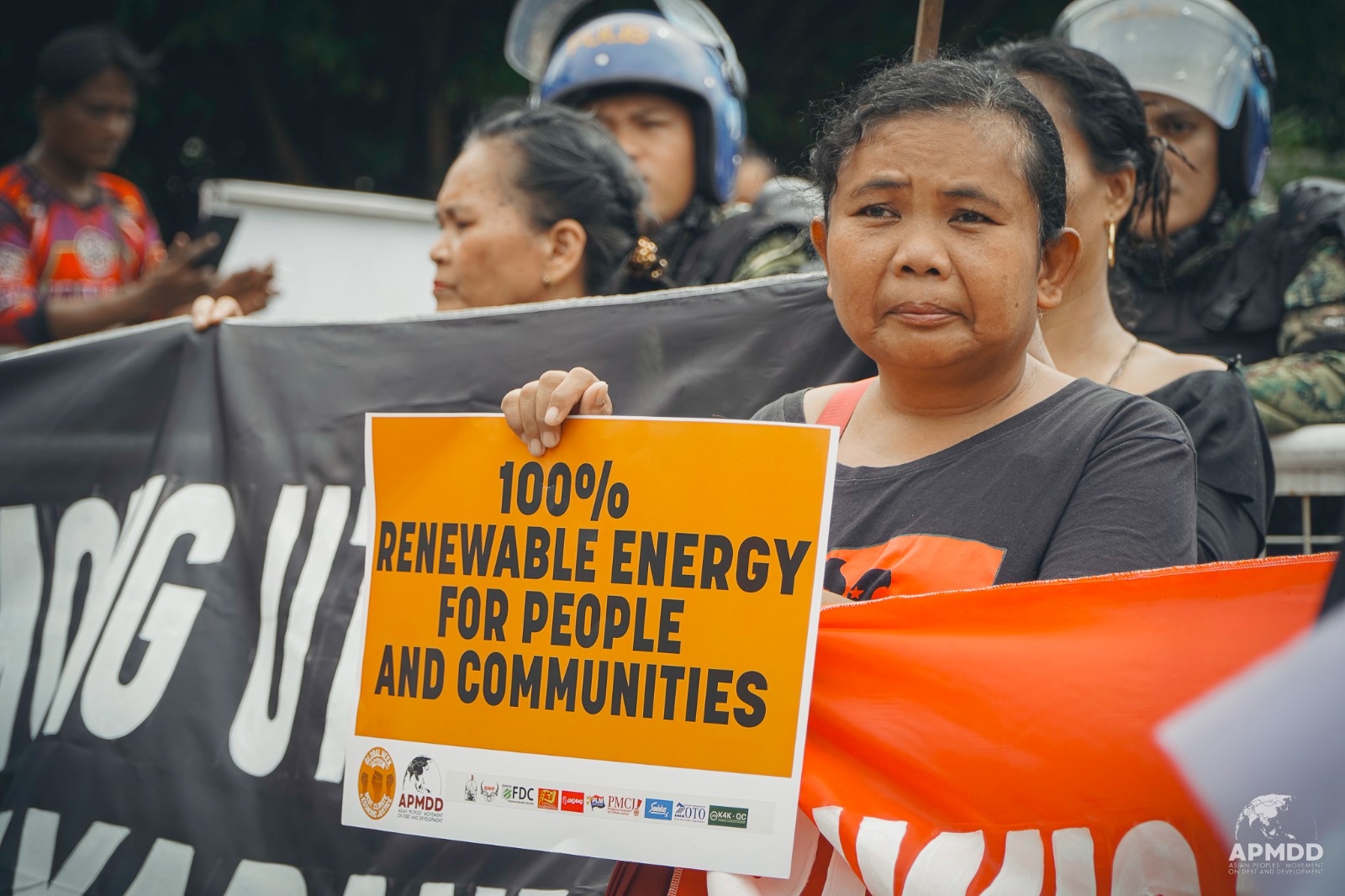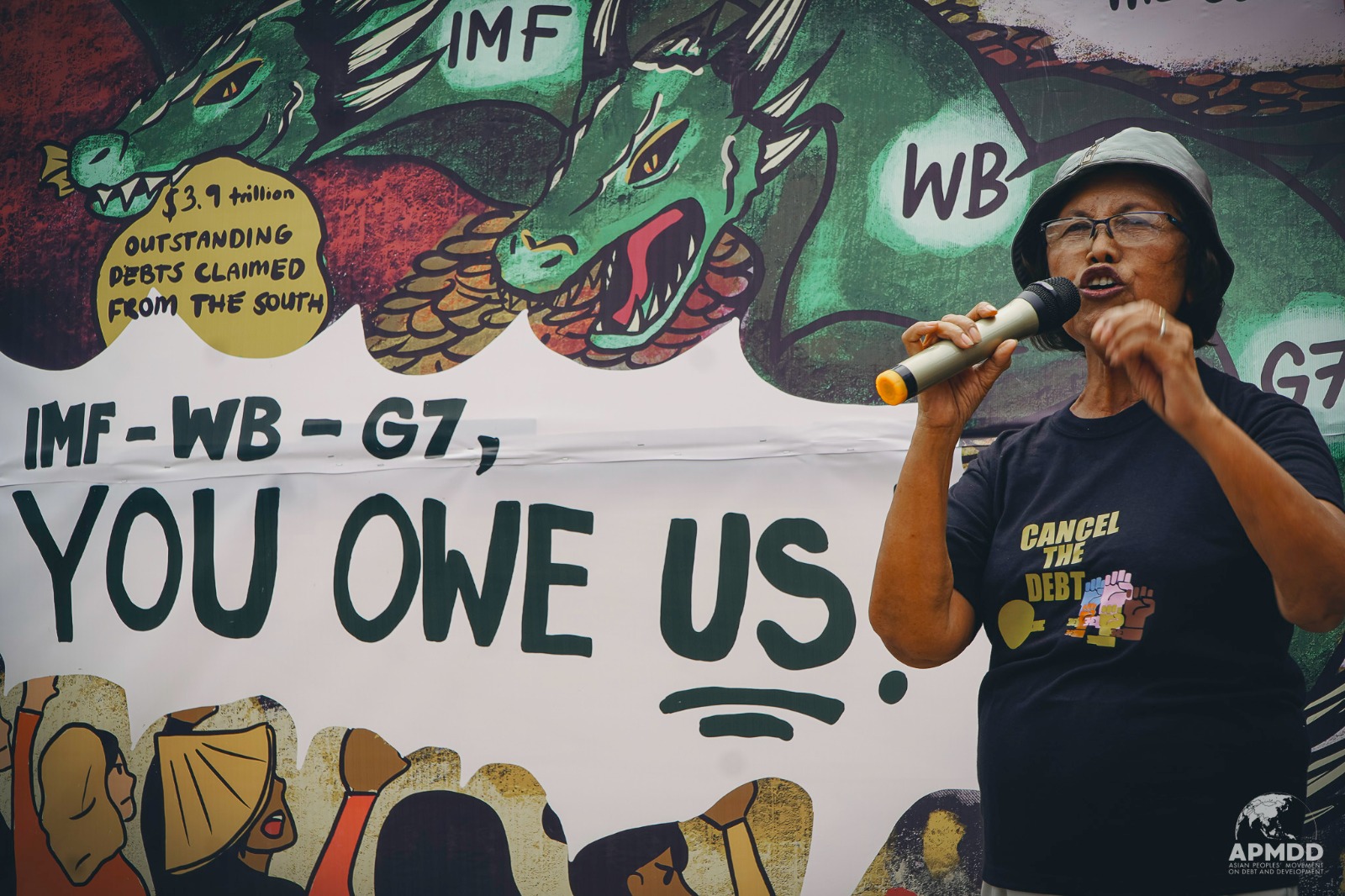
Members of the Asian Peoples’ Movement on Debt and Development (APMDD) took to the streets today, scoring the World Bank (WB), the International Monetary Fund (IMF) and G7 governments for worsening economic conditions in Global South countries and for further exacerbating the climate crisis. In the Philippines, Indonesia, Bangladesh, Pakistan, Sri Lanka and Nepal, they rallied around a common call: “cancel the debt and pay reparations for historical climate and economic injustices.”
Timed with the 2023 annual meeting of the IMF and World Bank, the rallyists joined hundreds of other organizations worldwide marking the Global Week of Action for Debt, Climate and Economic Justice. A statement endorsed by close to 500 organizations and individuals from 74 countries across all global regions denounced the IMF-WB, that “together with other private and public lenders, perpetuate a flawed international financial architecture that exacerbates debt, climate, and economic crises, violating the basic needs and rights of millions of people and nature who have the least contribution, responsibility or control over these catastrophes.”
In the Philippines, hundreds of demonstrators marched to Mendiola, gateway to the presidential palace, with the call “Cancel the debt and pay reparations for historical and continuing injustices!” Ousted dictator Ferdinand Marcos Sr. remains known for his repressive rule as well as for crony capitalism, massive ill-gotten wealth hidden in tax havens and billions of dollars in public debt that served no benefit for the Filipino people. Current President Marcos Jr. shows no sign of moving to repeal the dictator’s Automatic Appropriations decree, which remains in place and continues to ensure that debt repayments are made over any other public need.
Protesters also slammed the Philippine government’s continued expansion and support for debt-funded fossil fuel projects that they decried as ‘illegitimate’ for contributing to the climate crisis, dislocating communities and violating human rights.
“Global South governments should stop paying these illegitimate debts!” said Lidy Nacpil, APMDD Coordinator. “At the same time, lenders such as the IMF, the World Bank and G7 governments should stop pushing more loans as climate finance, and swiftly start the process of debt cancellation, adoption of wealth taxes for spending on urgent economic and climate action, and the rechanneling of public funds away from fossil fuel subsidies towards renewable energy systems.”
Rovik Obanil, Freedom from Debt Coalition Secretary General, recalled how the IMF and World Bank offered solutions in the form of “structural adjustment loans”, that came with such conditions as privatizing basic services and opening the Philippine economy to foreign investors. “These conditionalities were put in place decades ago but the consequences continue to violate our basic rights. Privatization reduces people’s access to water and electricity by catering only to those with the capacity to pay. Tax incentives rob us of potential revenue for urgent public needs. But loans continue to be pushed, including pushing loans for climate finance upon Global South peoples who least contributed to the climate crisis.”
SANLAKAS President Manjette Lopez noted growing discontent over skyrocketing prices of food staples and other goods and services. “From one administration to the next, the Filipino people are promised higher incomes, decent homes, adequate food, only to have these promises broken by elite and corporate-captured administrations, including the Marcos Jr. presidency. It’s time to cut the ties that bind us to international financial institutions such as the IMF-WB and their debt-creating solutions, but that can only happen with working people and communities at the forefront of bigger and bolder fights for jobs, living wages, a decent life and a sustainable future.”
Ian Rivera, National Coordinator of the Philippine Movement for Climate Justice said: “The IMF, World Bank and the G7 are again pushing their standard response to crisis in the Global South — more loans. Even climate finance, which is their obligation to deliver for contributing the most to the climate crisis, is in the form of more loans. This is clearly unjust. We demand grants-based climate finance and the cancellation of loans incurred from fossil fuel projects.”
For Oriang President Flora Santos, the IMF-World Bank’s gender mainstreaming strategy must be exposed for exploiting women’s unpaid care work to make up for the lack of public social services. “These international financial institutions brag about promoting women’s empowerment. The truth is that the IMF’s austerity loan conditions, such as budget cuts in public services, reductions in the public sector wage bill and regressive taxes, lead to reduced access to essential services, loss of livelihoods and increased unpaid work for women.”
Provided by Veritimes

